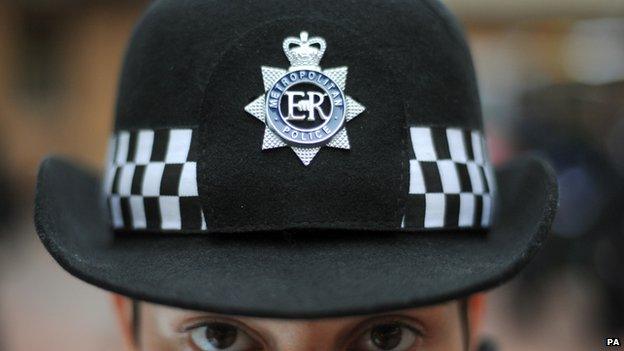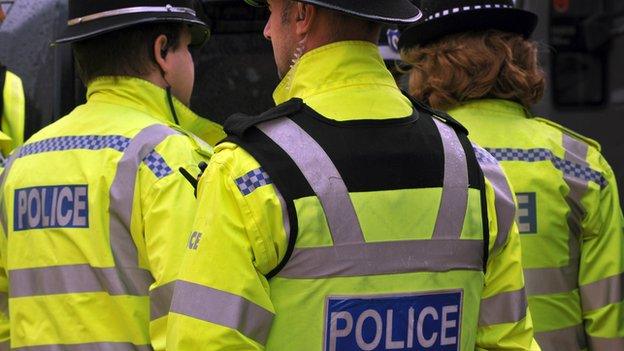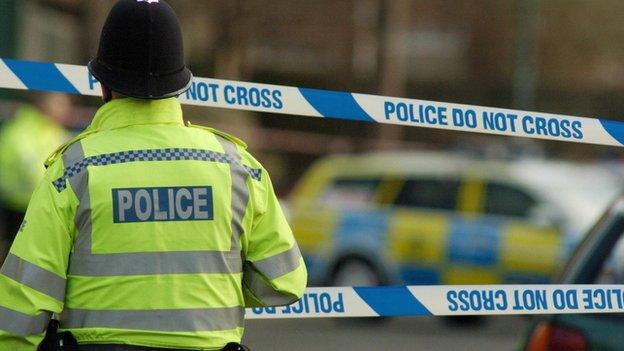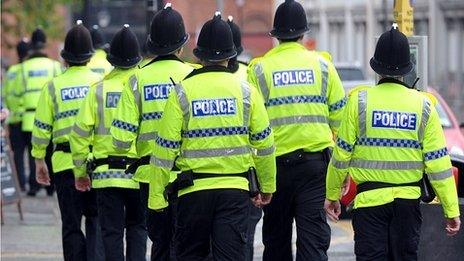Police forces in England and Wales 'rise to cuts challenge'
- Published

The public is noticing cuts to neighbourhood policing, the HMIC report has warned
Police forces in England and Wales have risen to the challenge posed by funding cuts - but neighbourhood policing has been affected, a report has found.
Her Majesty's Inspectorate of Constabulary (HMIC) found forces have cut £2.5bn from their budgets since 2011, with three told to do better.
But it raised , external"growing concerns" about the number of police on the beat.
The Police Federation said cuts were "damaging" forces, while Labour said 70% of savings came from officer cuts.
'Good reaction'
The report comes after it was announced in October 2010 that the central government funding grant to police forces in England and Wales was to be cut by 20%.
It found that of the 43 police forces, five were judged to have had an "outstanding" response to the cuts covering the period between 2011/12 and 2014/15. A further 35 were categorised as "good".
Three forces - Bedfordshire, Gwent and Nottinghamshire - were told they required improvement, the report said.

The best and worst performing forces
Outstanding:
Avon and Somerset
Norfolk
Lancashire
Staffordshire
West Midlands
Requiring improvement:
Bedfordshire
Gwent
Nottinghamshire

Overall, the number of police will drop by 16,300 (11%) between March 2010 and March 2015, the report said.
In the same period, the number of staff will fall by 14,500 (17%) and the number of police community support officers will be reduced by 3,600 (22%).
But forces have said the proportion of officers on the front line will be greater, rising from 89% to 92%.
HM Inspector of Constabulary Zoë Billingham said: "Police forces in England and Wales are to be congratulated.
"The vast majority have risen to and met the considerable challenge of austerity, with plans in place to save over £2.5bn over the last four years - while protecting the front line as best they can and making sure that the public still receive as an effective service."

The report warned some forces could be placed in jeopardy if cuts to funding continue
Forces at risk
But the watchdog warned the public had noticed cuts to neighbourhood police.
More than one in three people (36%) said they had seen fewer police on patrol in the past year.
HMIC also warned the future of some smaller forces could be at risk in the next three to five years, with some forces potentially unable to respond to "unexpected events".
Ms Billingham added: "Continuing to apply the cost reductions in the same way in the next four years as they've been applied in these four years is not an option, and we're very clear that the viability of some forces could be placed in jeopardy in three to five years' time.
"By that we mean they would have to cut too hard and too deep into neighbourhood policing and they may not be able to guarantee or maintain the service that we're currently seeing to the public."
HMIC's Zoe Billingham and Police Federation chairman Steve White discuss the police's reaction budget cuts.
Steve White, chairman of the Police Federation - which represents rank and file police officers - said the report had provided "clear evidence that cuts are damaging the police service and officers' capacity to keep the public safe".
"It is essential that action is taken on the points the report raised, in particular addressing the potential erosion of neighbourhood policing and crime prevention due to reductions to the front line," he added.
Yvette Cooper, Labour's shadow home secretary, said the report confirmed "the serious threat" to neighbourhood policing.
She said it was "clear ministers have not supported forces in achieving savings".
- Published3 July 2014

- Published30 May 2014
- Published30 June 2014
